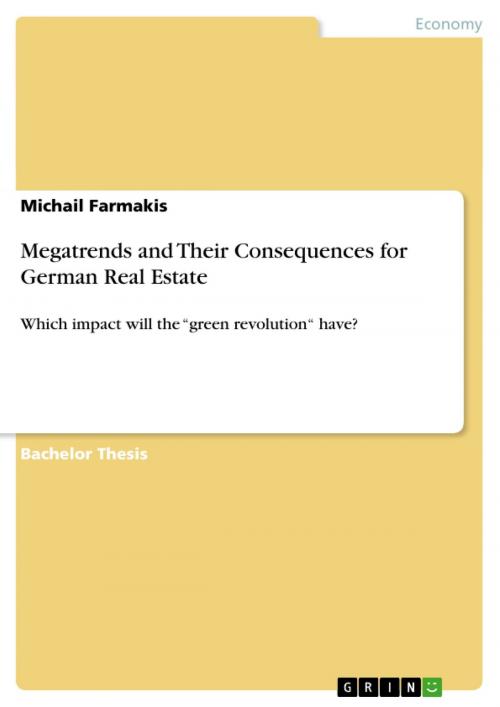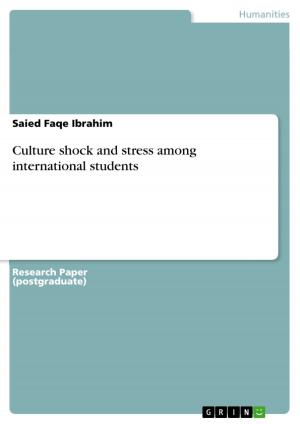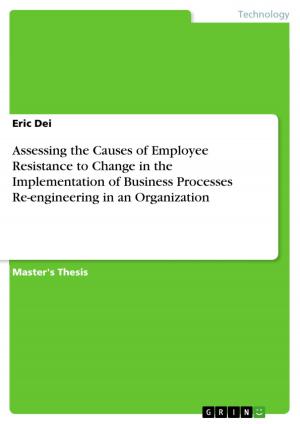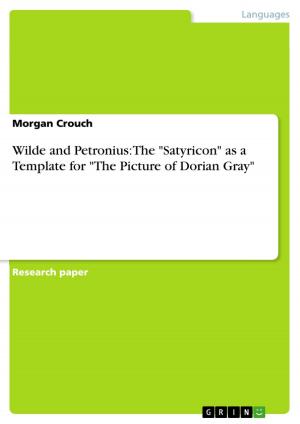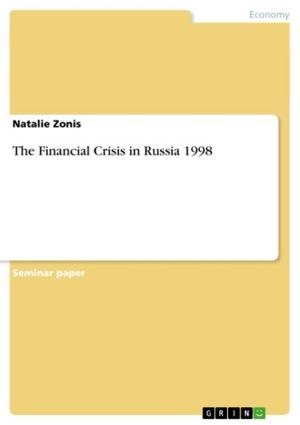Megatrends and Their Consequences for German Real Estate
Which impact will the 'green revolution' have?
Business & Finance| Author: | Michail Farmakis | ISBN: | 9783640641499 |
| Publisher: | GRIN Publishing | Publication: | June 14, 2010 |
| Imprint: | GRIN Publishing | Language: | English |
| Author: | Michail Farmakis |
| ISBN: | 9783640641499 |
| Publisher: | GRIN Publishing |
| Publication: | June 14, 2010 |
| Imprint: | GRIN Publishing |
| Language: | English |
Bachelor Thesis from the year 2010 in the subject Business economics - Miscellaneous, grade: 1,3, European Business School - International University Schloß Reichartshausen Oestrich-Winkel (Real Estate Management Institute), language: English, abstract: At the beginning of 2009, the owner of the Empire State Building unveiled his plan to 'go green'. The world famous skyscraper was completed in 1931 in New York, USA. The Art Deco building is currently in the midst of a $500m renovation, where $100m of these funds are designated for the green initiative. The green renovations are expected to decrease energy expenditures by 38 percent or $4.4m annually (Jonas, 2009). The example of the Empire State Building is not unique, since increased environmental awareness has affected nearly every industry. Companies across all industries and nations have launched green initiatives in order to improve their environmental performance and in response to the expressed concerns regarding their immediate environment. Currently, corporations compete to adopt and implement sustainable policies. Particularly the role of the real estate industry in reducing the environmental burden is considered to be the most important, as this industry is one of the largest emitters of harmful chemical substances and a major user of natural resources (Nelson, 2007, p. i). However, it is not enough to consider only the ecological aspects of real estate. This is because real estate, as a commodity, has an enormous economical impact. Other dimensions including economic and social aspects must also be examined. The term sustainability unites the three relevant dimensions. Over the last 20 years, bringing environmental protection to the same level as economic development and social concerns, sustainability has become a worldwide guiding principle. Sustainable development takes the future of mankind into account (Grunwald & Kopfmu?ller, 2006, p. 7). In the context of global challenges, sustainability means ensuring the addressing of future generation's needs. In contrast to other industries, the real estate industry has been slow to develop sustainable practices. However, today, the idea of sustainability greatly influences actions and motivations associated with the real estate industry. Efforts to create sustainability in real estate are reflected in the names of a large number of the development of building labels, including Green Buildings, Sustainable Buildings, or Zero Emission Buildings. In Addition, more and more developers, architects, engineers, property owners, and lenders consider sustainability issues when planning, constructing, renovating, or living on property.
Bachelor Thesis from the year 2010 in the subject Business economics - Miscellaneous, grade: 1,3, European Business School - International University Schloß Reichartshausen Oestrich-Winkel (Real Estate Management Institute), language: English, abstract: At the beginning of 2009, the owner of the Empire State Building unveiled his plan to 'go green'. The world famous skyscraper was completed in 1931 in New York, USA. The Art Deco building is currently in the midst of a $500m renovation, where $100m of these funds are designated for the green initiative. The green renovations are expected to decrease energy expenditures by 38 percent or $4.4m annually (Jonas, 2009). The example of the Empire State Building is not unique, since increased environmental awareness has affected nearly every industry. Companies across all industries and nations have launched green initiatives in order to improve their environmental performance and in response to the expressed concerns regarding their immediate environment. Currently, corporations compete to adopt and implement sustainable policies. Particularly the role of the real estate industry in reducing the environmental burden is considered to be the most important, as this industry is one of the largest emitters of harmful chemical substances and a major user of natural resources (Nelson, 2007, p. i). However, it is not enough to consider only the ecological aspects of real estate. This is because real estate, as a commodity, has an enormous economical impact. Other dimensions including economic and social aspects must also be examined. The term sustainability unites the three relevant dimensions. Over the last 20 years, bringing environmental protection to the same level as economic development and social concerns, sustainability has become a worldwide guiding principle. Sustainable development takes the future of mankind into account (Grunwald & Kopfmu?ller, 2006, p. 7). In the context of global challenges, sustainability means ensuring the addressing of future generation's needs. In contrast to other industries, the real estate industry has been slow to develop sustainable practices. However, today, the idea of sustainability greatly influences actions and motivations associated with the real estate industry. Efforts to create sustainability in real estate are reflected in the names of a large number of the development of building labels, including Green Buildings, Sustainable Buildings, or Zero Emission Buildings. In Addition, more and more developers, architects, engineers, property owners, and lenders consider sustainability issues when planning, constructing, renovating, or living on property.
